The 55th Session of the Human Rights Council
26 February – 5 April 2024
Item 7 – Interactive Dialogue with the Special Rapporteur on the Occupied Palestinian Territories
26th March 2024
Executive summary
On 26 March 2024, Francesca Albanese, Special Rapporteur on the OPT, shed light on the dire humanitarian situation in Gaza since Israel launched its devastating assault after the events of 7 October 2023.
Mrs Albanese presented harrowing findings, in particular the systemic dehumanisation of Palestinians and the alarming death toll caused by the occupation forces, which OCHA estimates as of 25 March 2024 to have reached over 32,000 people. She denounced Israel's distortion of language to legitimise actions tantamount to genocide, such as describing civilians as human shields or terrorists and falsely labelling hospitals as Hamas hiding spots. Albanese also underscored the deliberate measures aimed at preventing births within the Palestinian population, as well as the policy of enforced starvation, as tools of warfare wielded by the occupation to commit genocide against the Palestinian people.
Mrs Albanese underlined the impact of economic and military aid from powerful states in fuelling the assaults and called for a halt to military exports to Israel. Despite the gravity of the situation, Western countries widely abstained from participation in the session, except for Luxembourg, Spain, and the EU, the latter supported by Slovenia – an indication of the complicity in Israel’s crimes against humanity of many within the international community.
In her concluding statement, the Special Rapporteur reiterated the urgent need for accountability and action to address the ongoing crisis. She emphasised the responsibility of the international community to prevent genocide, urging countries to heed the calls of their citizens and join the proceedings initiated by South Africa. The dialogue underscored the persistent violations of human rights and international law in the occupied Palestinian territories, calling for a shift from viewing the situation as solely a humanitarian crisis to recognising its political roots. Mrs Albanese's impassioned plea served as a stark reminder of the ongoing suffering in the region and the imperative need for collective action to bring about meaningful change.
Background
The genocide in Gaza is a tragic consequence of decades-long conflict and political strife between Israel and Palestine. Rooted in the mid-20th century, the establishment of Israel as an independent state led to the displacement of hundreds of thousands of Palestinians from their ancestral lands, referred to as the Nakba, a “catastrophe” in Arabic.
Israel has for decades been imposing a stringent blockade on the territory, severely restricting the movement of people and goods. This blockade, coupled with frequent military incursions and airstrikes, resulted in dire humanitarian conditions, including widespread poverty, unemployment, and limited access to essential services such as healthcare and education.
The most devastating episodes of violence occurred during major Israeli military offensives, notably Operation Cast Lead in 2008-2009, Operation Pillar of Defense in 2012, and Operation Protective Edge in 2014. These campaigns resulted in extensive civilian casualties, massive destruction of infrastructure, and profound psychological trauma among the population.
Summary of the UN Report
During the 55th session of the Human Rights Council, the Special Rapporteur on the situation of human rights in the Palestinian territories occupied since 1967, Francesca Albanese, presented an extensive report shedding light on the harrowing realities endured by Palestinians. Drawing upon various sources, including data, analyses, and consultations with affected individuals and organisations, the report provided a sobering account of the catastrophic impact of the conflict, particularly in the Gaza Strip.
The report did not shy away from condemning the reprehensible acts committed by both Hamas and Israeli forces, emphasising the urgent need for accountability and justice. While acknowledging the limitations imposed by the geographic scope of the mandate, the report primarily focused on the dire situation in Gaza, where over 30,000 Palestinians, including more than 13,000 children, lost their lives in a relentless onslaught spanning five months. This assault left behind a trail of devastation, with residential areas obliterated, infrastructure destroyed, and communities torn apart.
Of particular concern was the assertion that Israel, in its pursuit of military objectives, had intentionally distorted humanitarian laws to justify its actions, raising alarming questions about the commission of genocide. The report underscored the systematic nature of the violence perpetrated against Palestinians, highlighting the deliberate targeting of civilians, including women and children, and the use of disproportionate force.
Moreover, the report situated these atrocities within the broader context of settler-colonialism in Palestine, tracing the historical patterns of displacement, dispossession, and oppression faced by the Palestinian people. It emphasised the ongoing denial of their right to self-determination and the relentless efforts to erase their presence from their ancestral lands.
In light of these findings, the report called for immediate action to address the humanitarian crisis unfolding in Gaza and other occupied territories. It urged the international community to uphold its obligations under international law, including the prevention and punishment of genocide, and to hold accountable those responsible for war crimes and human rights violations.
Ultimately, the report served as a stark reminder of the human cost of Israeli aggression and the urgent need for a just and lasting resolution that respects the rights and dignity of all parties involved.
The report meticulously detailed the harrowing aftermath of Israel's military operations in Gaza since 7 October 2023, revealing a grim picture of widespread devastation and loss of life that may constitute genocidal acts. With over 30,000 Palestinians, including a staggering number of innocent children, reported killed and thousands more presumed dead or missing, the scale of the tragedy was incomprehensible. The deliberate targeting of civilian infrastructure and densely populated areas had resulted in unimaginable suffering and loss, with entire neighbourhoods reduced to rubble and essential services crippled. Furthermore, the report highlighted the systematic mistreatment, torture, and killing of Palestinians, including arbitrary detention and the denial of medical care, painting a disturbing picture of deliberate harm inflicted upon the civilian population. Israel's blockade of Gaza, coupled with the destruction of vital infrastructure such as hospitals, schools, and water treatment facilities, had exacerbated an already dire humanitarian situation, pushing the population to the brink of starvation and disease. By systematically depriving Palestinians of the means to sustain life and subjecting them to relentless violence and deprivation, Israel's actions appeared to align with the criteria outlined in international law for genocide, raising profound moral and legal questions about accountability and justice in the face of such grave atrocities.
In the intricate web of conflict that enshrouded Gaza, the evidence laid bare painted a chilling portrait of genocidal atrocities perpetrated by Israel, casting a shadow over both individual perpetrators and the state apparatus. The deliberate and systematic targeting of civilians, including the most vulnerable segments of society, such as women and children, through constant bombardments and draconian siege tactics revealed a disturbing pattern of calculated brutality. The high toll of casualties, the intentional infliction of physical and psychological trauma, and the systematic imposition of life-threatening conditions collectively pointed towards a sinister intent to eradicate the target group in part or whole. Moreover, the venomous rhetoric espoused by high-ranking Israeli officials, which sought to dehumanise and vilify Palestinians, served as a catalyst for incitement to genocide, laying bare the moral bankruptcy at the heart of the conflict. Beyond the battlefield, the manipulation and distortion of international humanitarian law to justify indiscriminate violence, coupled with the callous use of civilians as human shields, marked a stark departure from the principles of humanity and compassion that underpinned the fabric of civilised society. This perversion of justice and moral decay underscored the urgent need for international scrutiny and accountability, lest the spectre of genocide continue to haunt the beleaguered land of Gaza, leaving behind a trail of devastation and despair.
Israel's actions were encapsulated by their attempt to justify indiscriminate attacks through the manipulation of legal concepts such as "proportionate collateral damage." They had blurred the line between civilian objects and military objectives, essentially abolishing the distinction. Entire residential areas in northern Gaza had been obliterated, with neighbourhoods in southern Gaza also under bombardment. Israel had expanded the definition of what constituted legitimate targets to include anything that might be used militarily, allowing for the destruction of entire neighbourhoods under the guise of legality.
Their strategy hinged on committing probable war crimes, framing them as adhering to international humanitarian law. This strategic premise reasonably inferred genocidal intent, as indiscriminate killing en masse became a military strategy. Israel's interpretation of IHL sought to provide legal cover for indiscriminate attacks by broadening the scope of what could be considered "incidental civilian harm."
However, all attacks on residential towers, conducted without warnings, foresaw extensive civilian harm as the primary outcome. The predictable killing or injuring of all civilians residing there was evident, as demonstrated by Israel's military personnel affirming that the target was a Hamas commander in an underground base.
For a proportionality assessment to be lawful, the principle of distinction must first be respected; otherwise, the anticipated civilian harm from an attack ceases to be incidental, unintended consequences of the attack itself. While both indiscriminate and disproportionate attacks appeared to have been systematically and repeatedly committed throughout Israel's recent campaign, the consistent classification by Israel of such actions as lawful suggested that it operated under a policy of condoning mass killing.
The text discussed Israel's implementation of evacuation orders and the establishment of safe zones in Gaza, purportedly to protect civilians during conflicts. However, these measures have been criticised for causing panic, forced displacement, and mass killings rather than ensuring safety. Israel's mass evacuation order for Palestinians in northern Gaza to designated "safe zones" in the south resulted in chaos and increased casualties due to intense bombing campaigns. Moreover, Israel's labelling of those who remained in northern Gaza as "human shields" or "accomplices" of terrorism further endangered civilians.
The text highlighted how designated safe areas became targets for Israeli attacks, with a significant percentage of bombs being deployed in these supposed safe zones. The indiscriminate targeting of evacuees and residents in safe areas resulted in a substantial number of casualties. Additionally, Israel's creation of humanitarian corridors for evacuation purposes turned into death corridors due to systematic bombardment and targeting by Israeli forces.
Furthermore, high-ranking Israeli officials openly discussed plans for ethnic transfer or expulsion of Palestinians from Gaza, indicating a potential agenda of ethnic cleansing. This, coupled with the deliberate destruction of Gaza's healthcare infrastructure and the framing of hospitals as military targets, suggested a genocidal intent behind Israel's actions.
In summary, Israel's implementation of evacuation orders and safe zones in Gaza has been criticised for exacerbating violence and endangering civilians,
Interactive dialogue
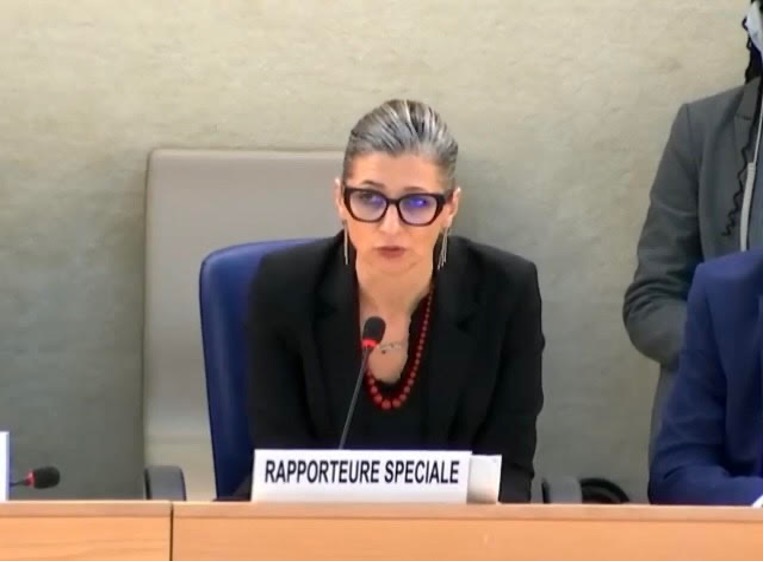 In her impassioned address during the interactive dialogue on occupied Palestinian territories, Mrs Albanese, as the Special Rapporteur on the occupied Palestinian territory, delivered a profound synthesis encapsulating the harrowing realities endured by the Palestinian people, particularly in Gaza. Commencing her discourse with a solemn acknowledgement of her role's gravity, she underscored the weight of delivering her fourth report amidst nearly six months of the unrelenting Israeli assault on Gaza, characterising it as "the anatomy of a genocide." This sombre declaration set the tone for her elucidation of the multifaceted layers of suffering and injustice endured by Palestinians, highlighting a history fraught with the systematic dehumanisation, dispossession, and apartheid policies inflicted upon them.
In her impassioned address during the interactive dialogue on occupied Palestinian territories, Mrs Albanese, as the Special Rapporteur on the occupied Palestinian territory, delivered a profound synthesis encapsulating the harrowing realities endured by the Palestinian people, particularly in Gaza. Commencing her discourse with a solemn acknowledgement of her role's gravity, she underscored the weight of delivering her fourth report amidst nearly six months of the unrelenting Israeli assault on Gaza, characterising it as "the anatomy of a genocide." This sombre declaration set the tone for her elucidation of the multifaceted layers of suffering and injustice endured by Palestinians, highlighting a history fraught with the systematic dehumanisation, dispossession, and apartheid policies inflicted upon them.
Drawing from historical context, Mrs Albanese articulated the insidious nature of genocide, portraying it not as a singular event but as a sinister process commencing with the dehumanisation of a group and culminating in its utter destruction. In eloquent prose, she lamented the plight of Palestinians, whose identity as a people has been consistently undermined and marginalised, rendering them "orphans of a homeland," as Edward Said poignantly articulated. Through meticulous exposition, she delineated the complex legal framework surrounding genocide in international law, acknowledging the formidable challenges in proving genocidal intent yet vehemently asserting the imperative of confronting and punishing such atrocities when unmistakably evident.
Transitioning from legal discourse to stark reality, Mrs Albanese delved into the catastrophic humanitarian crisis gripping Gaza, delineating the dire consequences of Israeli aggression. With heartfelt sorrow, she recounted the relentless assault's toll on Palestinian lives, including the deaths of thousands, the maiming of tens of thousands, and the targeting of various professionals critical to the community's well-being. Furthermore, she elucidated the deliberate policies of blockade and restrictions imposed by Israel, exacerbating food insecurity and subjecting the populace to starvation and despair. Through vivid imagery, she painted a grim picture of Gazan society besieged by deprivation and desperation, its resilience tested to its limits under the weight of Israeli oppression.
Mrs. Albanese's discourse did not merely recount statistics and legal definitions; it bore witness to the human suffering wrought by Israeli aggression. She spoke of the daily struggles endured by Gazans; the indignities suffered, and the trauma inflicted upon innocent civilians, all in the name of geopolitical agendas and ethnic supremacy. She recounted chilling accounts of Israeli soldiers' boasts of killing families, the wanton destruction of homes and infrastructure, and the desecration of sacred sites, underscoring the moral bankruptcy inherent in such actions.
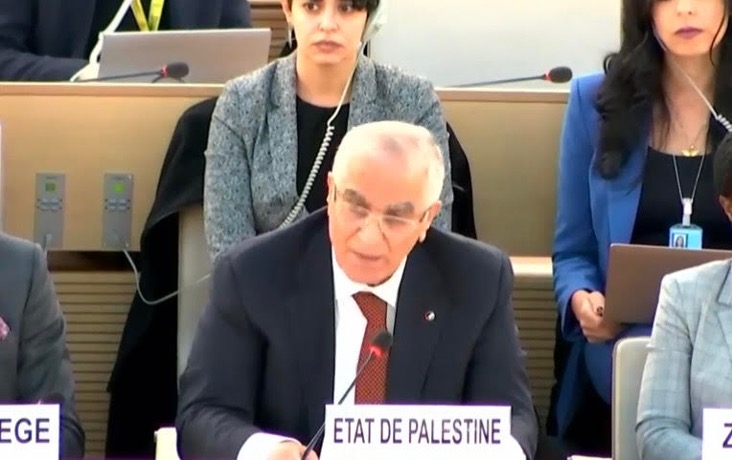 The delegate of Palestine expressed deep concern and dived into the OHCHR report while criticising its late release a day before the session. He welcomed the highlight of the numerous instances of information and evidence pointing towards the occupying powers' perpetration of the crime of genocide. It provided a historical context, mainly focusing on the settler colonial project in Palestine during the establishment of Israel as a Jewish state. The report documented the displacement and attempts to erase the identity of the original non-Jewish people of Palestine since the early 20th century.
The delegate of Palestine expressed deep concern and dived into the OHCHR report while criticising its late release a day before the session. He welcomed the highlight of the numerous instances of information and evidence pointing towards the occupying powers' perpetration of the crime of genocide. It provided a historical context, mainly focusing on the settler colonial project in Palestine during the establishment of Israel as a Jewish state. The report documented the displacement and attempts to erase the identity of the original non-Jewish people of Palestine since the early 20th century.
Specific references were made to declarations by figures like Joseph Feitz in 1940, who emphasised the exclusionary nature of the settler project, stating, "There is no place for two people on this land. The one and only solution is a Palestine without Arabs." The report also highlighted policies of ethnic cleansing in 1947 and 1948, which involved the destruction of 500 villages and Palestinian cities, as well as the killing of tens of thousands of Palestinians and the perpetration of barbaric acts of violence, including rape and abuse.
Furthermore, the occupying forces were accused of ongoing policies of discrimination, racism, and violations of international laws and norms. These included killings, abuse, theft, the building of illegal settlements, and the destruction of infrastructure, trees, mosques, and other vital facilities. The delegate condemned the continuous aggressions against Gaza, which has been under siege for 18 years, including the recent aggression described as the sixth against Gaza, resulting in significant civilian casualties, including thousands of children and women.
The delegate highlighted the statement made by the Israeli minister of war on October 9th, which indicated an intent to perpetrate war crimes and crimes against humanity by prohibiting essential supplies to Gaza and dehumanising the Palestinian people. This, combined with the refusal to abide by international decisions, including the ICJ decision to prevent genocide and resolutions from the General Assembly and Security Council, necessitated the implementation of practical measures to prevent further atrocities.
In his conclusion, the importance of implementing the recommendations in the report of the special rapporteur and taking practical measures to hold Israel accountable was underlined, including boycotting Israel commercially and politically and preventing the export of weapons to the aggressor.
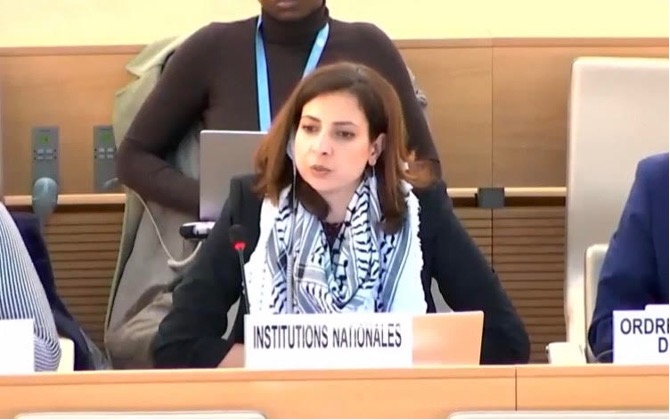
The Commissioner General of the Independent Commission for Human Rights of Palestine expressed concern over grave violations committed by Israeli forces in Gaza, including systematic attacks aimed at rendering the region uninhabitable. Israel's policies of collective punishment, such as the blockade and indiscriminate targeting of civilians, were condemned. Israel was urged to uphold its responsibilities as the occupying power, ensuring the protection and well-being of civilians. At the same time, the importance of providing urgent humanitarian assistance to Gaza was stressed. Furthermore, warnings against the dangers of any military operations in Rafah were issued, and any attempts at forced displacement of Palestinians from their land were rejected, with emphasis placed on such actions constituting severe violations of international law and humanitarian principles.
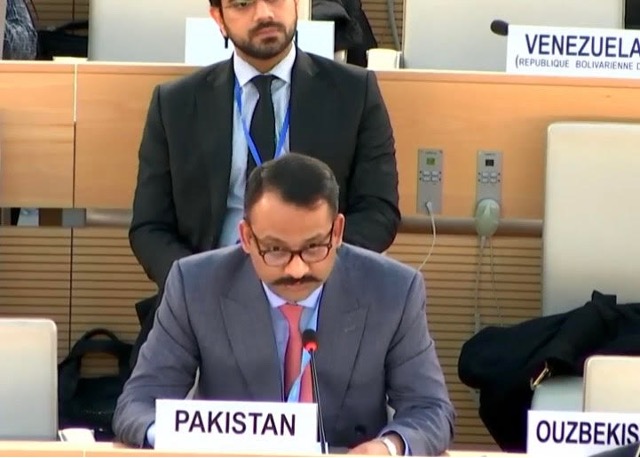 The delegate of Pakistan delivered an oral statement on behalf of the Organisation of Islamic Cooperation (OIC). They reaffirmed their support for the Special Rapporteur's mandate and voiced grave concern over attempts to silence discussions on the urgent human rights situation in occupied Palestine. The representative commended the Special Rapporteur for her courage in documenting Israel's ongoing aggression and acts amounting to genocide in Gaza, shedding light on the distortions of international law used by the occupation regime to justify its actions. They rejected efforts to dehumanise the civilian population in Gaza as collateral damage and emphasised that Israel's settler colonial project has been fully exposed. Pakistan, on behalf of the OIC, highlighted the need for accountability, demanding full implementation of the International Court of Justice's orders to prevent acts amounting to genocide against the Palestinian people in Gaza. They called for an arms embargo and economic sanctions against Israel for failing to comply with the court's orders and stressed that a hands-off approach is no longer viable.
The delegate of Pakistan delivered an oral statement on behalf of the Organisation of Islamic Cooperation (OIC). They reaffirmed their support for the Special Rapporteur's mandate and voiced grave concern over attempts to silence discussions on the urgent human rights situation in occupied Palestine. The representative commended the Special Rapporteur for her courage in documenting Israel's ongoing aggression and acts amounting to genocide in Gaza, shedding light on the distortions of international law used by the occupation regime to justify its actions. They rejected efforts to dehumanise the civilian population in Gaza as collateral damage and emphasised that Israel's settler colonial project has been fully exposed. Pakistan, on behalf of the OIC, highlighted the need for accountability, demanding full implementation of the International Court of Justice's orders to prevent acts amounting to genocide against the Palestinian people in Gaza. They called for an arms embargo and economic sanctions against Israel for failing to comply with the court's orders and stressed that a hands-off approach is no longer viable.
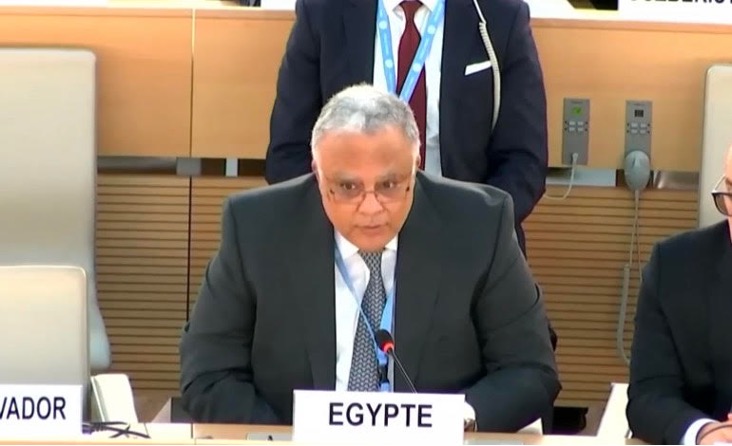 The statement delivered by the representative of Egypt on behalf of the Arab Group acknowledged the report's highlighting of the colonial occupation forces' commission of genocide against the Palestinian people, tracing this crime back to the longstanding settler-colonial project in Palestine. They condemned the unjustified attack on the Special Rapporteur and reiterated their unwavering support for her mandate. Furthermore, the Group denounced the distortion of international humanitarian law by the occupying power to conceal genocidal intent, emphasising that indiscriminate killing cannot be justified as "collateral damage" but should be recognised as genocide. In conclusion, the Group called on the occupying colonial power to respect the International Court of Justice's decision, implement an arms embargo, and other necessary measures to uphold international law and justice.
The statement delivered by the representative of Egypt on behalf of the Arab Group acknowledged the report's highlighting of the colonial occupation forces' commission of genocide against the Palestinian people, tracing this crime back to the longstanding settler-colonial project in Palestine. They condemned the unjustified attack on the Special Rapporteur and reiterated their unwavering support for her mandate. Furthermore, the Group denounced the distortion of international humanitarian law by the occupying power to conceal genocidal intent, emphasising that indiscriminate killing cannot be justified as "collateral damage" but should be recognised as genocide. In conclusion, the Group called on the occupying colonial power to respect the International Court of Justice's decision, implement an arms embargo, and other necessary measures to uphold international law and justice.
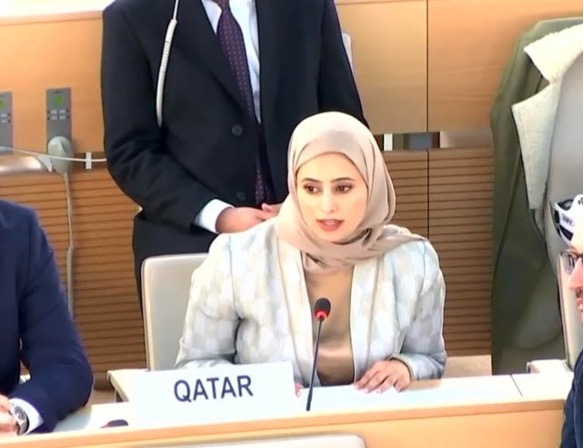 The representative of Qatar, on behalf of the Gulf Cooperation Council, described the Special Rapporteur report as a vital document detailing the Israeli genocide and the continuous grave violations against Palestinians over several decades. Emphasising the recent Israeli aggression in Gaza, characterised by the deliberate targeting of civilians and civilian infrastructure, including homes, schools, and hospitals, Qatar condemned these actions as part of Israel's persistent colonial settlement project in Palestine. Qatar urged the international community to fulfil its legal obligations by taking decisive measures to protect Palestinians from genocide and advance the peace process towards security and stability in the region. Qatar emphasised the imperative of restoring all legitimate rights of the Palestinian people and establishing their independent state within the borders of June 4, 1967, while calling for holding accountable all those responsible for the crimes and violations committed against them.
The representative of Qatar, on behalf of the Gulf Cooperation Council, described the Special Rapporteur report as a vital document detailing the Israeli genocide and the continuous grave violations against Palestinians over several decades. Emphasising the recent Israeli aggression in Gaza, characterised by the deliberate targeting of civilians and civilian infrastructure, including homes, schools, and hospitals, Qatar condemned these actions as part of Israel's persistent colonial settlement project in Palestine. Qatar urged the international community to fulfil its legal obligations by taking decisive measures to protect Palestinians from genocide and advance the peace process towards security and stability in the region. Qatar emphasised the imperative of restoring all legitimate rights of the Palestinian people and establishing their independent state within the borders of June 4, 1967, while calling for holding accountable all those responsible for the crimes and violations committed against them.
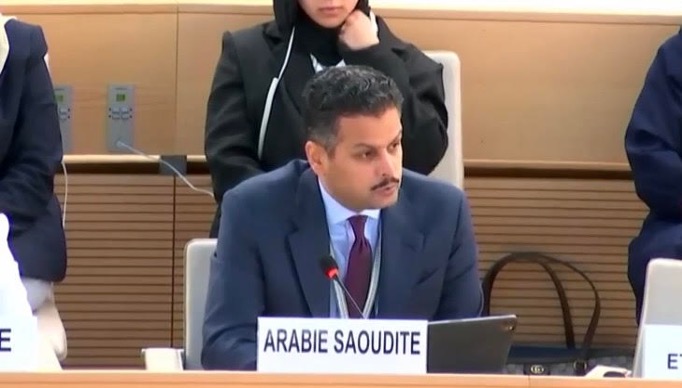 The delegate of Saudi Arabia acknowledged the special rapporteur's report, appreciating its conclusion that the threshold of genocide has been reached. He welcomed the Security Council resolution for an immediate ceasefire during Ramadan and urged the international community to end Israeli aggressions against innocent civilians in Gaza. Saudi Arabia emphasised the need for restoring Palestinian rights and establishing an independent state with East Jerusalem as its capital, in line with 1967 borders and international resolutions. They also highlighted humanitarian efforts, including a significant commitment from the Salman Center, calling for global support to protect Palestinian civilians.
The delegate of Saudi Arabia acknowledged the special rapporteur's report, appreciating its conclusion that the threshold of genocide has been reached. He welcomed the Security Council resolution for an immediate ceasefire during Ramadan and urged the international community to end Israeli aggressions against innocent civilians in Gaza. Saudi Arabia emphasised the need for restoring Palestinian rights and establishing an independent state with East Jerusalem as its capital, in line with 1967 borders and international resolutions. They also highlighted humanitarian efforts, including a significant commitment from the Salman Center, calling for global support to protect Palestinian civilians.
The Egyptian delegation thanked the noble and courageous effort in highlighting the plight of the Palestinian people. Egypt's statement underscored deep concern over grave violations committed by Israeli forces in Gaza, including systematic attacks aimed at rendering the region uninhabitable. Egypt condemned Israel's policies of collective punishment, such as the blockade and indiscriminate targeting of civilians, calling for their immediate cessation. The delegation urged Israel to uphold its responsibilities as the occupying power, ensuring the protection and well-being of civilians and stressed the importance of providing urgent humanitarian assistance to Gaza. Furthermore, Egypt warned against the dangers of any military operations in Rafah. It rejected any attempts at forced displacement of Palestinians from their land, emphasising that such actions constituted severe violations of international law and humanitarian principles.
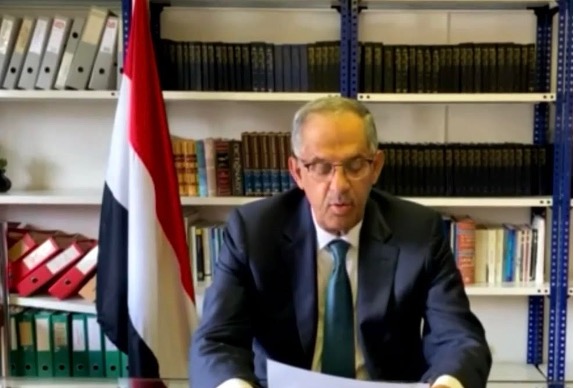 The representative of Yemen expressed support for the statements made by regional groups, and gratitude was extended to the Special Rapporteur for her update on the dire human rights situation in the occupied Palestinian territories, with a particular focus on Gaza. The Israeli aggression against Gaza was vehemently condemned, and a call was made to ensure access for the Special Rapporteur and the Permanent Investigation Committee to conduct an impartial investigation into the violations of international law and war crimes committed by Israeli occupation forces, specifically regarding the "genocide" in Gaza. Furthermore, condemnation was expressed towards the Israeli occupation authority's efforts to delegitimise the United Nations system and its experts, including the Special Rapporteur, the Permanent Investigation Committee, and UNRWA, to undermine the Palestinian cause. The immediate cessation of the Israeli war on Gaza and the West Bank was demanded, alongside the assertion of the rights of the Palestinian people to establish their independent state with East Jerusalem as its capital within the borders of June 4, 1967.
The representative of Yemen expressed support for the statements made by regional groups, and gratitude was extended to the Special Rapporteur for her update on the dire human rights situation in the occupied Palestinian territories, with a particular focus on Gaza. The Israeli aggression against Gaza was vehemently condemned, and a call was made to ensure access for the Special Rapporteur and the Permanent Investigation Committee to conduct an impartial investigation into the violations of international law and war crimes committed by Israeli occupation forces, specifically regarding the "genocide" in Gaza. Furthermore, condemnation was expressed towards the Israeli occupation authority's efforts to delegitimise the United Nations system and its experts, including the Special Rapporteur, the Permanent Investigation Committee, and UNRWA, to undermine the Palestinian cause. The immediate cessation of the Israeli war on Gaza and the West Bank was demanded, alongside the assertion of the rights of the Palestinian people to establish their independent state with East Jerusalem as its capital within the borders of June 4, 1967.
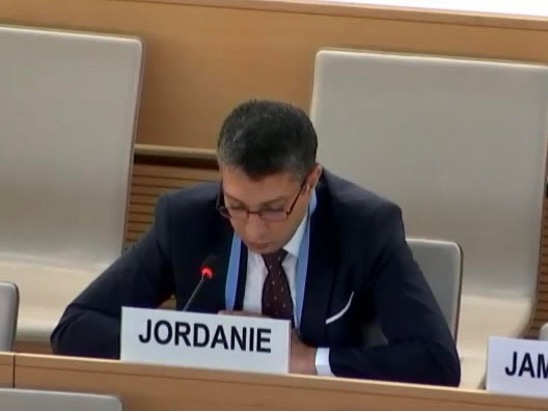 The delegate of Jordan voiced appreciation for the Special Rapporteur's report and underscored the urgent need for accountability; the delegate endorsed the Special Rapporteur's recommendations and welcomed Security Council Resolution 2728, calling for an immediate ceasefire and urging Israel's compliance. The delegate strongly condemned the unprecedented aggression against civilians, highlighting its contradiction with international norms and humanitarian principles. Stressing the necessity of a comprehensive, independent investigation into all violations of international law, the delegate called for the activation of Council-established mechanisms. The delegate reiterated the importance of ending the conflict, safeguarding civilians, facilitating aid delivery, and pursuing a just, two-state solution for lasting peace.
The delegate of Jordan voiced appreciation for the Special Rapporteur's report and underscored the urgent need for accountability; the delegate endorsed the Special Rapporteur's recommendations and welcomed Security Council Resolution 2728, calling for an immediate ceasefire and urging Israel's compliance. The delegate strongly condemned the unprecedented aggression against civilians, highlighting its contradiction with international norms and humanitarian principles. Stressing the necessity of a comprehensive, independent investigation into all violations of international law, the delegate called for the activation of Council-established mechanisms. The delegate reiterated the importance of ending the conflict, safeguarding civilians, facilitating aid delivery, and pursuing a just, two-state solution for lasting peace.
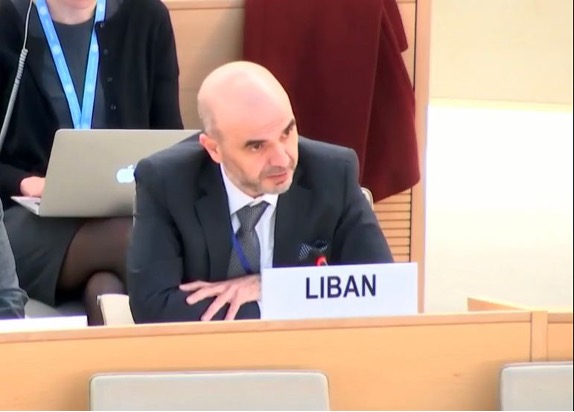 The representative of Lebanon emphasised the critical need for accountability for the severe violations detailed in the report and voiced full support for the recommendations made by the Special Rapporteur. Additionally, they welcomed Security Council Resolution 2728, which mandated an immediate ceasefire and called for Israel's compliance with it. The delegation condemned the unprecedented aggression against civilians, highlighting its clear breach of international norms and humanitarian principles. Furthermore, they urged for a comprehensive, independent investigation into all infringements of international law, stressing the activation of mechanisms established by the Council for this purpose. In conclusion, they reiterated the urgent necessity to halt the conflict, safeguard civilians, facilitate the delivery of humanitarian aid, and pursue a just and comprehensive peace based on a two-state solution.
The representative of Lebanon emphasised the critical need for accountability for the severe violations detailed in the report and voiced full support for the recommendations made by the Special Rapporteur. Additionally, they welcomed Security Council Resolution 2728, which mandated an immediate ceasefire and called for Israel's compliance with it. The delegation condemned the unprecedented aggression against civilians, highlighting its clear breach of international norms and humanitarian principles. Furthermore, they urged for a comprehensive, independent investigation into all infringements of international law, stressing the activation of mechanisms established by the Council for this purpose. In conclusion, they reiterated the urgent necessity to halt the conflict, safeguard civilians, facilitate the delivery of humanitarian aid, and pursue a just and comprehensive peace based on a two-state solution.
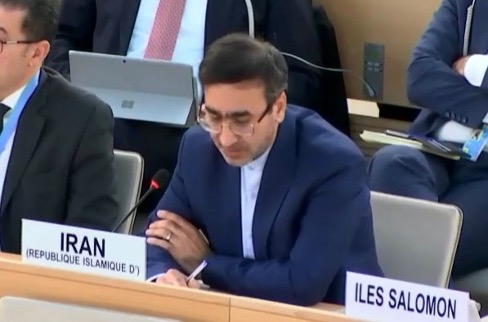 In its statement, the representative of the Islamic Republic of Iran highlighted the alarming findings of the Special Rapporteur's report on Palestine, which revealed ongoing atrocities committed by occupying forces over the past five months. Reflecting on the 75-year history of oppression endured by Palestinians, Iran underscored the unimaginable suffering imposed upon them by the occupying forces. Iran condemned the occupiers' systematic violations of international law and human rights, emphasising their delusional pursuit of legitimacy through continued oppression. Iran firmly asserted that a 75-year legacy of atrocities could never justify the occupiers' claim to be a regional neighbour. Directing a question to the Special Rapporteur, Iran sought insights into effective measures the international community could undertake to secure Palestinians' right to self-determination promptly.
In its statement, the representative of the Islamic Republic of Iran highlighted the alarming findings of the Special Rapporteur's report on Palestine, which revealed ongoing atrocities committed by occupying forces over the past five months. Reflecting on the 75-year history of oppression endured by Palestinians, Iran underscored the unimaginable suffering imposed upon them by the occupying forces. Iran condemned the occupiers' systematic violations of international law and human rights, emphasising their delusional pursuit of legitimacy through continued oppression. Iran firmly asserted that a 75-year legacy of atrocities could never justify the occupiers' claim to be a regional neighbour. Directing a question to the Special Rapporteur, Iran sought insights into effective measures the international community could undertake to secure Palestinians' right to self-determination promptly.
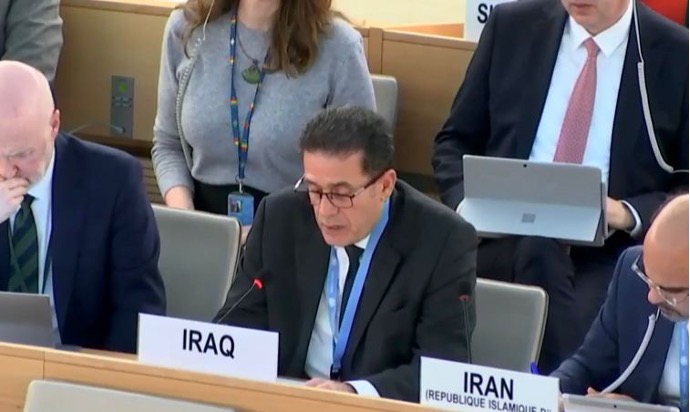 The representative of Iraq condemned the reported genocide, crimes against humanity, and war crimes perpetrated against the Palestinian people, stressing the urgent need for accountability for such atrocities. The representative emphasised that the ruthless killing of children cannot be justified and called for an immediate and unconditional ceasefire to allow humanitarian aid to reach Gaza promptly. Moreover, they underscored the vital role of UNRWA in assisting the Palestinian people, highlighting Iran's contribution of $25 million to support its operations. The representative also condemned all attacks on hospitals and shelters and the policy of starvation, asserting that turning a blind eye to such acts is a stain on humanity. In conclusion, they reiterated that achieving security in the region hinges on granting the Palestinian people their right to self-determination and establishing their independent state, with Jerusalem as its capital. They concluded by thanking the President for his attention.
The representative of Iraq condemned the reported genocide, crimes against humanity, and war crimes perpetrated against the Palestinian people, stressing the urgent need for accountability for such atrocities. The representative emphasised that the ruthless killing of children cannot be justified and called for an immediate and unconditional ceasefire to allow humanitarian aid to reach Gaza promptly. Moreover, they underscored the vital role of UNRWA in assisting the Palestinian people, highlighting Iran's contribution of $25 million to support its operations. The representative also condemned all attacks on hospitals and shelters and the policy of starvation, asserting that turning a blind eye to such acts is a stain on humanity. In conclusion, they reiterated that achieving security in the region hinges on granting the Palestinian people their right to self-determination and establishing their independent state, with Jerusalem as its capital. They concluded by thanking the President for his attention.
In his address, the representative of Pakistan applauded the professional integrity and perseverance in documenting the atrocities committed against the besieged Palestinians. Pakistan echoed the concerns raised by the Special Rapporteur regarding the blatant crimes and violations of international law in the OPT and the impunity enjoyed by the occupying forces. He highlighted the alarming commitment of certain states to the so-called 'international rules-based order,' which has enabled Israel to perpetuate its apartheid regime and commit egregious crimes without accountability. Pakistan condemned the continuous, systematic violations of international law by Israeli occupying forces and extremist settlers in the Occupied West Bank, emphasising the urgent need for an immediate ceasefire, implementation of the International Court of Justice's provisional measures, unhindered access to UN human rights mechanisms, and a two-state solution based on the pre-1967 borders. He concluded by thanking the President for his attention.
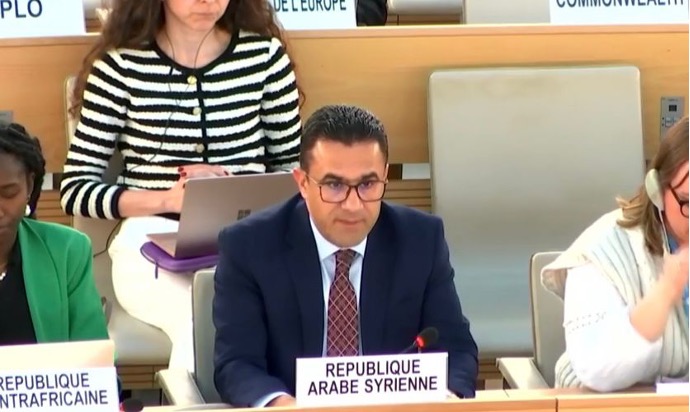 The permanent representative of Syria emphasised the historical context of Palestinian suffering, spanning over seven decades, marked by massacres and ethnic cleansing since the Nakba in 1948. Syria urged all UN bodies not to overlook this context and called for efforts to hold accountable the perpetrators of these crimes and their supporters. Furthermore, Syria vehemently condemned the complicity of certain countries against the legitimate rights of the Palestinian people, particularly their right to self-determination, rejecting justifications propagated by the occupying entity to conceal its crimes and ensure continued impunity.
The permanent representative of Syria emphasised the historical context of Palestinian suffering, spanning over seven decades, marked by massacres and ethnic cleansing since the Nakba in 1948. Syria urged all UN bodies not to overlook this context and called for efforts to hold accountable the perpetrators of these crimes and their supporters. Furthermore, Syria vehemently condemned the complicity of certain countries against the legitimate rights of the Palestinian people, particularly their right to self-determination, rejecting justifications propagated by the occupying entity to conceal its crimes and ensure continued impunity.
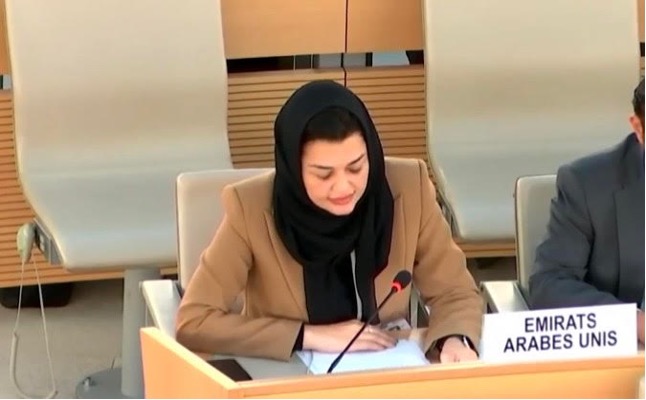 The delegate of the United Arab Emirates vehemently condemned the unjustifiable Israeli actions in Gaza. It emphasised the imperative of preventing further loss of life while upholding the Geneva Conventions and avoiding escalation in the region. Furthermore, the UAE reiterated its support for the International Court of Justice's decisions to protect civilians and halt any incitement or acts of genocide against Palestinians in Gaza. Expressing concern over the plight of the Palestinian people, particularly regarding food insecurity in Gaza, the UAE pledged to collaborate with relevant international entities to ensure the timely and sustainable delivery of humanitarian aid without hindrance, including through the activation of the humanitarian sea corridor. Lastly, the UAE welcomed the Security Council's unprecedented adoption of a resolution calling for an immediate ceasefire during Ramadan.
The delegate of the United Arab Emirates vehemently condemned the unjustifiable Israeli actions in Gaza. It emphasised the imperative of preventing further loss of life while upholding the Geneva Conventions and avoiding escalation in the region. Furthermore, the UAE reiterated its support for the International Court of Justice's decisions to protect civilians and halt any incitement or acts of genocide against Palestinians in Gaza. Expressing concern over the plight of the Palestinian people, particularly regarding food insecurity in Gaza, the UAE pledged to collaborate with relevant international entities to ensure the timely and sustainable delivery of humanitarian aid without hindrance, including through the activation of the humanitarian sea corridor. Lastly, the UAE welcomed the Security Council's unprecedented adoption of a resolution calling for an immediate ceasefire during Ramadan.
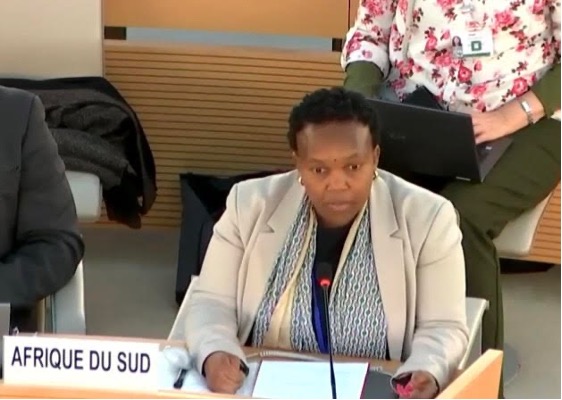 The representative of South Africa underscored the recent provisional measures issued by the International Court of Justice, calling for Israel's implementation. South Africa supported the Special Rapporteur's recommendations, including imposing an arms embargo and other economic and political measures to uphold international law. Urging for an immediate comprehensive ceasefire in Gaza and the release of hostages, South Africa highlighted the necessity for expanded humanitarian access and proper funding for UNRWA to meet the growing needs of Palestinians.
The representative of South Africa underscored the recent provisional measures issued by the International Court of Justice, calling for Israel's implementation. South Africa supported the Special Rapporteur's recommendations, including imposing an arms embargo and other economic and political measures to uphold international law. Urging for an immediate comprehensive ceasefire in Gaza and the release of hostages, South Africa highlighted the necessity for expanded humanitarian access and proper funding for UNRWA to meet the growing needs of Palestinians.
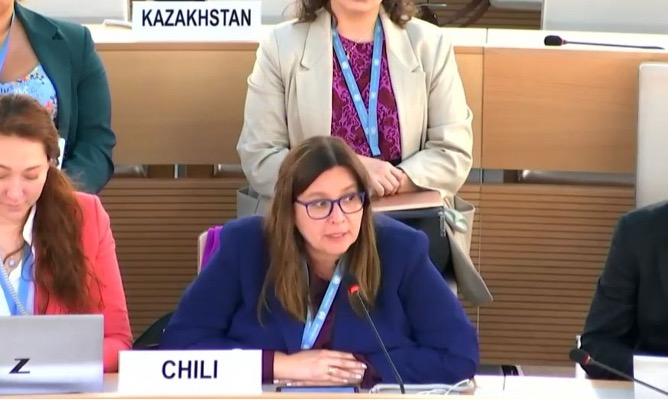 The Chilean delegation praised the rapporteur's courageous work despite facing limitations in accessing the occupied territories. Chile condemned the prolonged blockade of Gaza, tightened since October 7, 2023, emphasising its detrimental impact on millions of people and highlighting the failures of the humanitarian protection system. They denounced military operations that contravened ICJ provisional measures and urged the international community to spare no effort in ending the occupation. Chile stressed the urgent need for direct negotiations between Israel and Palestine, leading to a just and definitive peace agreement within the framework of a two-state solution, alongside a call for international recognition of Palestine as a full member of the United Nations.
The Chilean delegation praised the rapporteur's courageous work despite facing limitations in accessing the occupied territories. Chile condemned the prolonged blockade of Gaza, tightened since October 7, 2023, emphasising its detrimental impact on millions of people and highlighting the failures of the humanitarian protection system. They denounced military operations that contravened ICJ provisional measures and urged the international community to spare no effort in ending the occupation. Chile stressed the urgent need for direct negotiations between Israel and Palestine, leading to a just and definitive peace agreement within the framework of a two-state solution, alongside a call for international recognition of Palestine as a full member of the United Nations.
 In her address, the delegate of Spain highlighted the severe humanitarian crisis in Gaza and emphasised Spain's consistent calls for compliance with international humanitarian law. Spain urged adherence to the provisional measures outlined by the International Court of Justice and echoed the UN Security Council's demand for an immediate ceasefire. The representative reaffirmed Spain's unwavering support for UNRWA's humanitarian efforts and its commitment to working with the Palestinian Authority for peace. Furthermore, she advocated for the two-state solution and proposed convening an international Peace Conference.
In her address, the delegate of Spain highlighted the severe humanitarian crisis in Gaza and emphasised Spain's consistent calls for compliance with international humanitarian law. Spain urged adherence to the provisional measures outlined by the International Court of Justice and echoed the UN Security Council's demand for an immediate ceasefire. The representative reaffirmed Spain's unwavering support for UNRWA's humanitarian efforts and its commitment to working with the Palestinian Authority for peace. Furthermore, she advocated for the two-state solution and proposed convening an international Peace Conference.
 The European Union representative acknowledged the Special Rapporteur's report, underlining the necessity of thorough, independent investigations into all allegations. Expressing dismay at the significant loss of civilian lives and the dire humanitarian situation, the EU recalled the conclusions of the European Council from March 22. Condemning Hamas for its indiscriminate terrorist attacks, the EU upheld Israel's right to self-defence under international law, calling for the immediate release of all hostages. Concerned about the humanitarian crisis in Gaza, especially its impact on children, urgent action was urged to prevent further displacement and ensure civilian protection. The EU underscored the binding nature of the International Court of Justice's order from January 26, 2024, reiterating the need to uphold international legal standards. Perpetrators of violence in the West Bank and East Jerusalem were strongly condemned, with a call for accountability. With the recent approval of Resolution 2728 by the UN Security Council, the EU reiterated its steadfast commitment to a lasting peace based on the two-state solution.
The European Union representative acknowledged the Special Rapporteur's report, underlining the necessity of thorough, independent investigations into all allegations. Expressing dismay at the significant loss of civilian lives and the dire humanitarian situation, the EU recalled the conclusions of the European Council from March 22. Condemning Hamas for its indiscriminate terrorist attacks, the EU upheld Israel's right to self-defence under international law, calling for the immediate release of all hostages. Concerned about the humanitarian crisis in Gaza, especially its impact on children, urgent action was urged to prevent further displacement and ensure civilian protection. The EU underscored the binding nature of the International Court of Justice's order from January 26, 2024, reiterating the need to uphold international legal standards. Perpetrators of violence in the West Bank and East Jerusalem were strongly condemned, with a call for accountability. With the recent approval of Resolution 2728 by the UN Security Council, the EU reiterated its steadfast commitment to a lasting peace based on the two-state solution.
National Human Rights Institutions and Non-Governmental Organisations
As the chairperson presided over the session, representatives from various NGOs presented their views on the ongoing hostilities in Israel and Gaza. They found themselves amidst unprecedented tensions, urging all parties to be accountable for their actions. Palestinian non-state armed groups and Israel were criticised for displaying a reckless disregard for fundamental principles of international law, including basic rules of international humanitarian law. The NGOs stressed the international community's obligation to ensure accountability for war crimes, crimes against humanity, or acts of genocide, providing effective remedies to victims. Failure to uphold human rights would undermine relief efforts, challenging humanitarian missions. They urged the Special Rapporteur and the Commissioner of Inquiry to investigate and report grave breaches of international law committed in the occupied Palestinian territory and Israel. Special procedures, reflecting international norms and standards, should receive political and material support from council members. The NGOs asked the Special Rapporteur about measures to encourage all parties to cooperate with investigations and implement findings.
Subsequent NGO interventions reflected divergent perspectives on the situation. Pro-Israeli NGOs questioned the Special Rapporteur's approach, criticising her report's focus and alleging bias. They emphasised the terrorist attacks by Hamas on October 7 and accused the Special Rapporteur of downplaying their anti-Semitic nature. In contrast, pro-Palestinian NGOs highlighted Israel's atrocities and war crimes against civilians in Gaza, including children, calling for immediate action to stop the genocide. They urged the international community to hold Israel accountable and cease all military operations in the occupied Palestinian territory. The discourse underscored the complexity of the situation and the deep divisions within the council regarding the Israeli-Palestinian conflict.
Concluding remarks
As Mrs Albanese approached her conclusion, her impassioned plea for action resonated with a sense of urgency and determination. Transitioning from a tone of lamentation to one of unwavering resolve, she implored the international community to not only acknowledge the plight of the oppressed but also to confront the stark reality of genocide unfolding before their very eyes. With clarity and conviction, she underscored the imperative for decisive measures to be taken in pursuit of accountability and justice. Drawing upon the principles enshrined in international law, Mrs Albanese urged member states to go beyond mere rhetoric and to take concrete actions, such as imposing sanctions and an arms embargo on Israel. By doing so, she argued, the international community could challenge the prevailing impunity that has perpetuated the cycle of violence and oppression in the occupied Palestinian territories. In her closing remarks, she left no ambiguity, calling upon the conscience of humanity to stand in unwavering solidarity with the Palestinian people and to ensure that the atrocities witnessed in Gaza are not only acknowledged but also never repeated.
Position GICJ
The Geneva International Centre for Justice (GICJ) calls for immediate action against Israel's violations of international law, including humanitarian and human rights laws. It strongly urges the immediate lifting of the siege on Gaza and the complete cessation of the occupation of Palestinian territory.
GICJ highlights the deliberate imposition of restrictions on aid and relief measures as collective punishment on Gazans, disproportionately affecting women and children. The organisation emphasises the crucial role of all States and the Human Rights Council in pressuring Israel to end the occupation and ensure the protection of Palestinian human rights.
GICJ echoes the necessity of holding perpetrators of international crimes accountable for justice and underscores the collective responsibility of the international community to end the crisis and prevent further loss of life. The organisation calls on States to refrain from financially supporting Israel, especially through arms transfers, which violate international humanitarian law. It demands that the UN Security Council overcome political deadlock and adopt binding resolutions to effectively safeguard the Palestinian people. GICJ reiterates the imperative for Israel to halt genocide, withdraw from illegally occupied territories, dismantle the apartheid regime, and recognise Palestinian self-determination.







